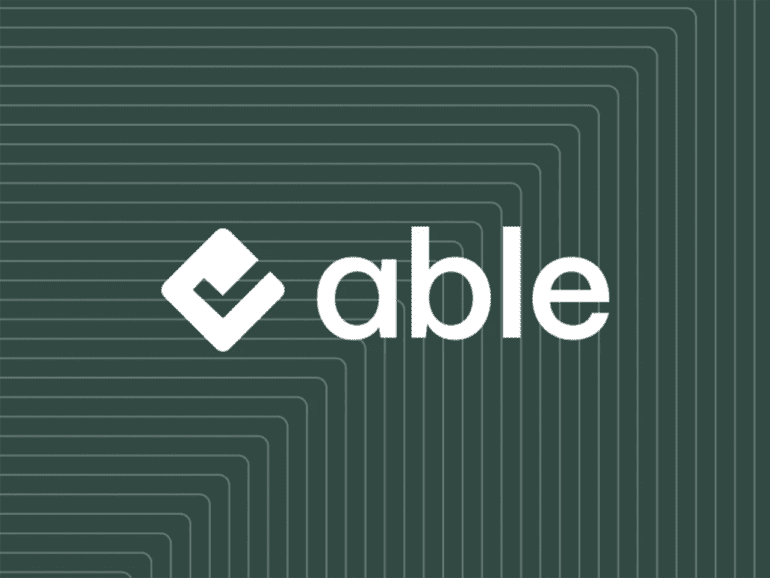Launching out of stealth with a $20M Series A in June, Able AI flattens the logarithmic paperwork curve of the commercial finance industry through an AI platform that makes processing loan applications fast and easy.
Co-Founder Diego Represas started his fintech career right out of college, getting one of the first twelve seats at Digit as an engineering team lead. Why would a successful startup division head leave his post during the height of the pandemic in November 2020 to create something of his own?
The Mexico City native founder said when it comes down to it, Able AI aims to make it easier to access capital because reducing the cost of business makes the world a better place.
“In a capitalist economy, you need energy to power everything, capital, and human creativity. There are inefficiencies across all three categories that make it hard to create things,” he said. “Reducing the cost of capital has a huge impact. Because if you can make it just 1% cheaper to get capital, it has a compounding effect over 20 years of the economy.”
Unfortunately, getting the funding gears turned regarding the commercial lending space is difficult.
Commercial funding not all fund and games
In 2020, after four years of building a team tackling personal financial health with Digit, Represas said he heard of a new problem to solve. In passing, his cousin mentioned that it was a pain to try and get a commercial loan for a full-grown business.

“He walked me through what it was like to originate or issue one of these business loans for a commercial loan. I was just floored. I was like, ‘This can’t be possible, this can’t be how it actually happens,'” he said. “I told him, Hey, I have some extra time, I’m going to call some banks in the U.S. and ask them how they do it. I found out that my cousin’s problem was everybody’s problem.”
The monthlong application and hundreds of forms made the process a nightmare, to the point that some larger companies in the U.S. employ full-time brokers who work on only four loan deals a year.
Represas called up Andrew Hurst, a software engineer, and co-founder-to-be, and they went work in the middle of Covid.
“When I left Digit, I remember one of the execs was like, ‘are you sure you want to leave in the middle of Covid? We got you,'” he said. “And I was like, ‘man; I’m pretty sure I want to leave.'”
The product
In November 2020, they launched with seed funding, and for two years, the duo built a team and secured commercial lending deals. They help take in paperwork and process lending in the $100K-$1 million zone and up to $10 million and $50 million. The platform is not directly targeted toward smaller business funding and is not an underwriter; Represas said: Able Ai is built with the commercial funder in mind.
“To understand this, you have to sit in the seat of somebody doing the job of a lender or commercial banker,” he said. “When you sit through their day-to-day and see the friction and what causes their headaches, it’s about getting the information together.”
It’s not the credit calculation; these are on-track businesses with endless financial documentation, sales, sheets, and reports. It’s that pile of documentation to begin and the diminishing returns of adding more to the top of it, Represas said. Especially on the sales side, securing more deals to raise commission only makes the processing process take longer.
“It’s getting all the information together first. Imagine you have to fill out these loan packets, like imagine a mortgage on steroids,” he said. “This makes no sense. Especially if you’re on the sales side and if you’re supposed to be a producer. The more successful they became getting business and satisfying customers, the more they got drowned by paperwork.”
No solution to solve the intake problem
No one software solution in the market could solve the intake problem, Represas said, and Able built out a solution through a combination of AI and other techniques.
He said that Able could process SMB loans or any type of transaction that takes in a ton of paperwork, hinting at other avenues the firm will explore in the future, but SMB lending is already a low-click process. “Microloans” under $100 K are expensive and unsecured, Represas said, and SMB owners can get them online without submitting any documentation.
“For a typical transaction, you can get rid of 50% of paperwork; like completely get rid of it,” he said. “But there are certain little hurdles that you need to cross and little bits of magic that you need to add into the technology platform, which we don’t have right now.”
He said in the future, Able aims to build the tech platform to do more than process.
What problems are you looking to solve?
Represas said he found his interest in machine learning and AI after getting a scholarship to Stanford from army service. Out of college, he took the opportunity to work at Digit and helped grow the team from 12 to over 100 by the time he left. Before he found his way to a fintech startup, he had generally avoided finance.
“But Digit came into my lap one way or another, and I took it, and it completely changed my mind about how finance works; Digit has a very psychological way of thinking about money,” he said.
“It made me realize how money is a question of feelings and less a question of rationality, especially in the consumer side, and more a question of emotions.”
He started as a data scientist and built a team of his own as a tech lead and uses that startup experience today at Able, he said. As a founder, the trouble was not in leading a team or raising money. Instead, Represas said the challenge was selling in a notoriously tricky marketplace for startups to survive.
“Fundraising is among the bottom five challenges. The biggest challenge is the reality that we are choosing to sell into a market that is notoriously hard for a startup to be. It’s a market where large commercial banks throw away startups daily,” he said. “Selling into a large commercial bank is difficult, and many reasons exist. There’s a lot of risk aversion, a lot of compliance, and a lot of people in the firm to work with, and it just takes a lot of time to build that alignment.”
Be scrappy: You don’t need the best of everything to win
In a set of parting advice, Represas said that winning within a challenging market — especially as a startup fintech selling to traditional large banks — it pays to specialize and not generalize. Able made the right decision in the particular market for what they are trying to do.
“I don’t think you need the best of everything to win. If you’re a SaaS company selling to large enterprise customers, especially risk-averse customers, I will give that advice,” he said. “It’s a long and arduous process to get in there from day zero, he said, you have to punch above your weight to get in, but you don’t have to do that for everything.”
Why some startups do better than others comes down to two or three variables: where did you start, what was the market you started in/ how healthy is that market, and what is the talent pool for what you are trying to accomplish?
“If you are fishing in fertile waters, you’re going to do better than somebody who fishes in harder spots or empty waters,” he said, hence the startup in a market that eats startups. “Generally, people who are much more competent at their task, and have the right mindset and values will execute better on all these different tasks than people who don’t.”


